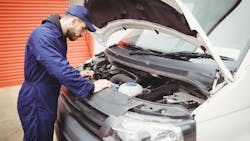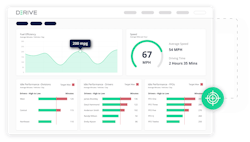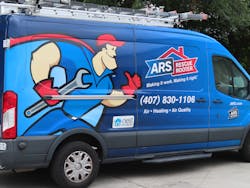Fleets remove 1B metric lbs. of CO2 with engine recalibration software
Derive Systems has announced that through its VQ Efficiency platform, its customers such as ARS Rescue Rooter and Eversource Energy, have removed over 500,000 metric tons of CO2 emissions, or 1 billion metric lbs., from being released into the atmosphere.
VQ Efficiency platform is a software solution that works by recalibrating and optimizing Classes 1-6 engines for a specific region or route, taking temperature and topography into account. Via the OBD-II port, Derive overwrites the current tables controlling engine rpm to a set optimized for the operating region. This is a one-time, 30-minute install, with performance monitored through the Mission Control dashboard.
“Derive is moving aggressively to help fleets solve the issue of carbon emissions with our unique engine software calibration technology,” said CEO John Oechsle. “We are striving to provide solutions today to create a better environment tomorrow, and we are extremely excited that enterprise companies are adopting our technology across the country.”
Oechsle said the Efficiency platform is available for nearly two out of every three fleet vehicles (62%), typically for Model Year 2013 and newer.
And where there’s better fuel efficiency, there is likely less stress put on the engine, improving overall total cost of ownership.
According to Derive, “adjusting the parameters of a vehicle’s engine to minimize fuel waste during vehicle acceleration reduces redline shifting and engine wear-and-tear with more certainty than trying to modify driver behavior.”
The platform also has an available feature to govern speeds, ensuring drivers are not overworking the engines and expending extra fuel to burn rubber.
Derive said its efforts support the current administration’s new carbon reduction targets and reduced CO2 goals for the trucking industry and service fleets. Service fleets are responsible for 17% of the carbon output, and the administration has a goal that fleets reach an average of 52 mpg by 2026.
Derive clients agree with the positive impact of their carbon reduction strategies.
“At ARS, we focus on our people and the environment; we chose to work with Derive because of their technology that promotes vehicle safety while reducing our environmental impact,” stated Kevin O’Donnell, director of purchasing and fleet at ARS.
When implementing the VQ Efficiency solution on ARS’ fleet of 3,500 vans, the estimated emission reduction was approximately 6.9 million lbs. of CO2 emissions per year (3,166 Metric Ton). That equates to removing the emissions impact of 210 vans from the road, according to Derive.
“The VQ Efficiency platform from Derive has already saved our fleet 10-12% on mpg economy and slashed fuel costs,” said Michael Rorison, Eversource director of fleet operations.
Eversource is a public utility with 9,000 employees and fields over 5,500 vehicles and pieces of equipment to service its customers. Its fleet include pick-up trucks, service vans, and bucket trucks. In addition, Eversource is engaged with various pollution control and fuel cost savings devices, and Derive’s VQ Efficiency is a significant part of the equation.
“We are very pleased with the performance of VQ Efficiency from Derive, which has brought along additional benefits we did not expect,” Rorison said.
“In addition to the efficiency and carbon reduction benefits, lowering idle speeds and having a range of Engine Control Unit oversight means our linesmen working out in the field can keep the cabin temperature regulated in trucks and remain a little cooler while they do their work,” Rorison continued.



